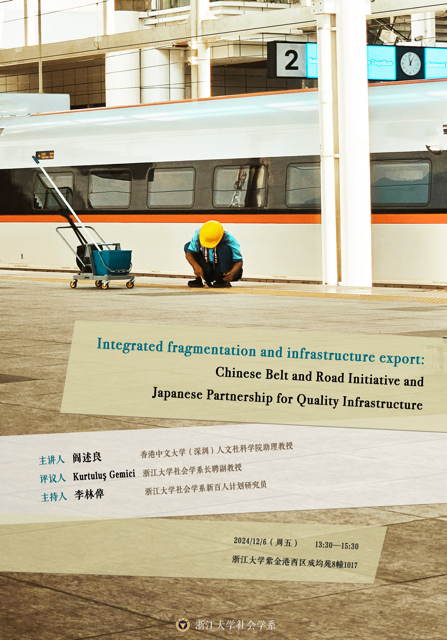
讲 座 信 息
题目:Integrated fragmentation and infrastructure export: Chinese Belt and Road Initiative and Japanese Partnership for Quality Infrastructure
时间:2024年12月6日(周五)13:30-15:30
地点:浙江大学紫金港西区成均苑8幢1017
概要:This paper examines the domestic policy coordination processes underlying China’s Belt and Road Initiative (BRI) and Japan’s Partnership for Quality Infrastructure (PQI). Existing scholarship often restricts analysis to the state level, overlooking the roles of domestic actors, such as firms and non-governmental organizations, in shaping policy processes. They focus on the role of state institutions as the ones driving infrastructure export and take the agency of domestic actors, such as firms and non-governmental organizations, as given. This study addresses this conceptual and empirical gap by highlighting the fragmented yet integrated nature of decision-making in domestic politics in China and Japan. Using a comparative analysis, we advance the concept of ‘integrated fragmentation’ to describe how diverse state, quasi-state, and non-state actors reach consensus despite policy fragmentation, through formal and informal processes involving consensus-building, signal-sending, and bargaining. Our analysis reveals how both China and Japan's state institutions learn to use market mechanisms, such as profit identification, alongside traditional bureaucratic tools, to overcome fragmentation and drive infrastructure export. In the process, we argue that the deployment of market mechanisms demonstrated the state’s ability to go beyond traditional forms of control, such as institutional encroachment and administrative orders. Using China and Japan’s high-speed rail export as case studies, namely the Jakarta-Bandung High-Speed Railway Project and the Mumbai-Ahmedabad High-Speed Railway Project, this paper argues that both countries’ infrastructure export has been driven by shared goals of domestic economic growth, despite geopolitical rivalry. Through these two cases, this paper demonstrates how state institutions overcome fragmentation and use market mechanisms such as profit identification to drive infrastructure export. We conclude that integrated fragmentation allows for simultaneous competition and cooperation, driving domestic economic goals while navigating international rivalries.
主讲人:阎述良,香港中文大学(深圳)人文社科学院助理教授
加拿大多伦多大学政治学博士,研究领域包括国际与比较政治经济学、全球霸权与国际秩序、亚太国际关系、产业政策与科技创新、以及基层治理与社会资本。他的学术研究曾发表于Review of International Political Economy, Journal of Social Policy, the British Journal of Politics and International Relations, the Pacific Review等多个国际期刊。
评议人:Kurtuluş Gemici,浙江大学社会学系长聘副教授
He is a comparative-historical sociologist working on international finance, the sociology of markets, and theory. His work has appeared in journals such as Theory & Society, Socio-Economic Review, Sociological Theory, and Politics & Society. Recent publications include Capital Mobility and Distributional Conflict (Routledge, 2020) and How Global Are Investment Banks? (Regional Studies, 2020, with Karen Lai).
主持人:李林倬,浙江大学社会学系新百人计划研究员
芝加哥大学社会学博士,研究领域为知识社会学、计算社会科学、经济社会学。研究方向为知识系统和经济系统中的创新、颠覆、不确定性和层级相关的议题。研究发表在Poetics, Plos One, npj Urban Sustainability, 和社会学研究等中英文期刊上。